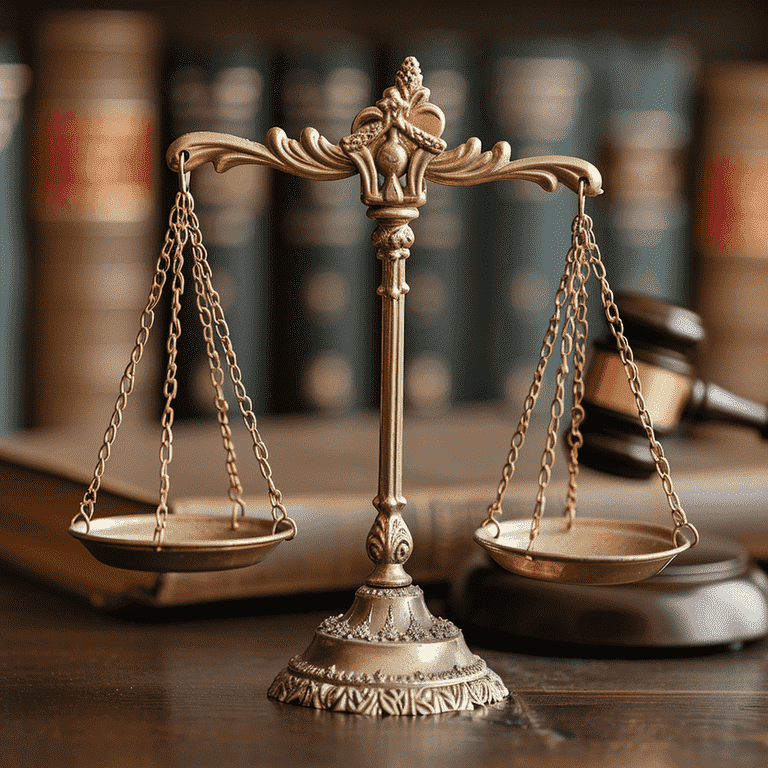The Nevada bail system is a critical component of the state’s judicial process.
It plays a pivotal role in balancing the rights of the accused with the needs of the justice system.
This system is rooted in centuries-old legal tradition. It allows individuals charged with a crime to remain free while awaiting trial. They must meet specific financial or conditional requirements.
Note: Make sure to also check out our Bail Bonds Explained to Nevadans post while you’re here

 Bail in Nevada is significant. It immediately impacts defendants. It has broader implications for legal fairness and social justice.
Bail in Nevada is significant. It immediately impacts defendants. It has broader implications for legal fairness and social justice.
By exploring the inner workings of this system, we can gain a deeper understanding of its role in the lives of those who encounter it.
History and Evolution of Bail in Nevada
The concept of bail has a long history. It stretches back to English common law. Bail has evolved significantly over the years in Nevada.
The bail system in Nevada was initially designed to ensure a defendant’s appearance in court. It has undergone various reforms to address changing societal views and legal standards.
These reforms have made the bail process more equitable and just. They reflect a growing awareness of the system’s impact on different population segments.
The historical trajectory of bail in Nevada is not just a legal evolution.
It also reflects the state’s changing priorities and values.

The Bail Process Explained
Arrest and Booking: The Initial Step
When a person is arrested in Nevada, the first step in the bail process is the booking procedure. This involves recording the individual’s personal information.
It also involves recording the nature of the alleged offense, and taking fingerprints and photographs. The booking process is a crucial administrative step.
It lays the groundwork for the subsequent bail determination.
The Bail Hearing: Determining Bail Amount
Following the arrest, a defendant will typically undergo a bail hearing.
During this hearing, a judge determines the amount of bail based on various factors.
These include the severity of the alleged crime, the defendant’s criminal history, and the likelihood of them appearing for future court dates.
The outcome of this hearing significantly influences the defendant’s immediate future.
It decides whether they can return to their daily life while awaiting trial.
Factors Influencing Bail Decisions
Several key factors influence bail decisions in Nevada. These include:
The nature and severity of the alleged crime.
The defendant’s previous criminal record, if any.
The defendant’s ties to the community, such as family connections or employment.
The risk of the defendant fleeing before trial.
Types of Bail Options in Nevada
Nevada offers various types of bail options, catering to different circumstances. These include:
Cash Bail: A sum of money paid in full to secure release.
Surety Bond: A bail bond secured through a bail bond agent.
Property Bond: Using property as collateral for release.
Own Recognizance (O.R.): Release based on the defendant’s promise to appear in court, typically granted in cases of low risk.
Each type of bail comes with its own set of conditions and implications. It offers a range of options for defendants based on their situations.

Role of Bail Bond Agents in Nevada
Bail bond agents play a crucial role in Nevada’s bail system.
They act as intermediaries between the court and defendants. Defendants cannot pay the full bail amount. These agents provide a bail bond. It’s essentially a promise to the court that the defendant will appear for their scheduled hearings. In return, defendants typically pay the bail bond agent a non-refundable fee. The fee is usually 10% of the bail amount. The relationship between bail bond agents, defendants, and the court is complex. It balances financial risk, legal responsibility, and the agent’s accountability for the defendant’s court appearance.
Controversies and Challenges
Criticisms of the Bail System
The Nevada bail system is not without its critics. One significant point of contention is the perception that the system favors the wealthy. They can afford bail. The less affluent may remain incarcerated because they can’t pay. This disparity raises questions about fairness and equality in the judicial process.
Disparities in Bail Assignment
Disparities in bail assignment can have profound effects on individuals and families. Critics argue that this inequity can lead to prolonged jail time for people with limited money. This happens regardless of their guilt or innocence. Such situations can result in job loss and family disruption. They can also lead to other negative social consequences.
Impact on Low-Income Individuals and Communities
The bail system often has the most profound impact on low-income individuals and communities. The financial burden of bail can be insurmountable for some. This leads to extended periods of incarceration while awaiting trial. This situation affects the defendants. It also has ripple effects on their families and communities.
Recent Developments and Reforms
Legislative Changes in Nevada’s Bail System
In recent years, several legislative changes have aimed to reform Nevada’s bail system. These reforms seek to address concerns around fairness and equity. They focus on reducing reliance on financial bail and exploring alternative release options.
The Push for Bail Reform: Advocacy and Opposition
The movement for bail reform in Nevada has gained momentum. Various advocacy groups are pushing for changes that emphasize justice and equality. However, these efforts have also met opposition. Some argue that the current system is necessary. It ensures court appearances and public safety.
Case Studies: Impact of Recent Reforms
Examining specific case studies helps us understand the impact of recent bail reforms in Nevada. These cases highlight how legislative changes affect individuals and the judicial system practically. They illustrate both successes and ongoing challenges in the reform process.
Navigating the Nevada Bail System: A Guide for Defendants and Families
Navigating the bail system can be daunting for defendants and their families. They are understanding the process, from arrest to potential release on bail. Seeking legal help early on is vital. A lawyer can provide guidance and advocacy throughout the process. Defendants must also be aware of the bail conditions. Ensuring compliance is essential to avoid further legal complications.
By following this guide, individuals and families can better navigate the complexities of the Nevada bail system. They can make informed decisions. They can understand their rights and responsibilities within the judicial system.
Economic Impact of the Bail System in Nevada
The bail system in Nevada has economic implications. These implications go beyond the individuals directly involved.
The financial burden of bail can be overwhelming for defendants. This is especially true for those from low-income backgrounds.
The need to pay a significant amount to secure freedom, even temporarily, often leads to complex financial decisions.
It can result in long-term economic hardship. On a broader scale, the bail industry contributes to Nevada’s economy.
Bail bond agents and legal professionals employ people. They generate revenue through administrative processes.
But, this economic benefit is set against the societal costs. Potentially incarcerating individuals who cannot afford bail. This includes loss of employment, loss of productivity, and financial strain on public resources.
Why You Have Not Hired a Felony Defense Attorney Yet
Watch this short video to take the next big step toward defending your rights against a felony charge.

Breaking It All Down for You
In summary, “An Insider’s Look at the Nevada Bail System” sheds light on a complex and multifaceted aspect of the legal system.
The bail system in Nevada has historical roots. It is a dynamic entity. It is continually evolving in response to legal, social, and economic pressures.
Understanding this system is crucial for those directly involved in the judicial process. It’s important for a broader audience. This audience is interested in the intersections of law, justice, and society.
Nevada continues to grapple with the challenges and implications of its bail system. The importance of informed discussion and thoughtful reform remains paramount.

Frequently Asked Questions
What happens if a defendant fails to appear in court after being released on bail?
If a defendant misses their court appearance after being released on bail, the court may issue an arrest warrant. If bail was paid through a bond, the bail bond agency may seek to recover the amount from the defendant or co-signers.
Are there alternatives to bail in Nevada for pretrial release?
Yes, options include release on recognizance, pretrial supervision, or electronic monitoring. The choice depends on the case and the defendant’s history.
How is the bail amount determined in Nevada?
The judge considers factors like the severity of the crime, criminal history, ties to the community, and likelihood of returning to court. The amount aims to ensure appearance while considering ability to pay.
Can bail be contested or appealed in Nevada?
Yes, defendants can request a bail reduction hearing or appeal if bail is denied.
What role do defense attorneys play in the bail process in Nevada?
Defense attorneys represent defendants’ interests, argue for lower bail or release on recognizance, and provide legal advice.
How long before a bail hearing in Nevada?
Generally within 48 hours of arrest, excluding weekends and holidays.
Consequences for co-signers of a bail bond?
Co-signers are financially responsible if the defendant doesn’t appear in court. They may also pay fees incurred in locating and returning the defendant to custody.
How does the bail system affect repeat offenders in Nevada?
Repeat offenders may face higher bail amounts or stricter conditions due to prior criminal history.
Does a defendant's employment status affect bail decisions in Nevada?
Yes, stable employment may lead to lower bail amounts or alternative release conditions.
Are there specific laws governing bail bond agencies in Nevada?
Yes, Nevada has laws covering licensing, financial practices, and ethical conduct of bail bond agents.
Additional Resources for You

In addition to providing top-tier legal representation, our lead attorney, Molly Rosenblum Allen, Esq., has also created an array of valuable resources to assist you during challenging times. These resources offer insights and guidance on critical legal topics, ensuring you’re well-informed and prepared. Here’s an overview of the resources available:
Double Jeopardy: Understanding your rights and the legal implications of being tried for the same offense twice. Read more.
Hung Jury: Learn about the complexities and outcomes when a jury cannot reach a unanimous verdict. Read more.
Circumstantial Evidence: Gain insight into how indirect evidence can impact your case. Read more.
Indicted vs Charged: Understand the differences and legal nuances between being indicted and being charged. Read more.
Difference Between Jail and Prison: An informative guide on the distinctions between these two types of incarceration facilities. Read more.
What are Miranda Rights: A crucial read on your rights during a police interrogation and under custody. Read more.
How to Check if You Have an Outstanding Warrant: Guidance on staying informed about your legal status and any outstanding warrants. Read more.
What to Look for in a Criminal Defense Lawyer: Essential tips for selecting the right legal representation for your case. Read more.
Possible Ways to Reduce a Felony Charge: Explore strategies that may help in reducing the severity of a felony charge. Read more.
Should You Accept a Plea Bargain: An in-depth look at the considerations and implications of accepting a plea deal. Read more.
We invite you to leverage these resources, crafted by Molly Rosenblum Allen, Esq., to navigate your legal journey with confidence and clarity.

Offsite Resources You May Find Helpful
Here are several offsite resources related to legal matters and the criminal justice system that you may find useful. Each of these websites offers a wealth of information that can provide further insight and support:
American Bar Association (ABA): A prominent organization providing resources on various legal topics, including criminal law and the justice system. Visit ABA
National Association of Criminal Defense Lawyers (NACDL): An organization dedicated to ensuring justice and due process for persons accused of crime. Visit NACDL
- FindLaw: A resource for legal information and finding attorneys, useful for understanding legal procedures and locating legal assistance. Visit FindLaw
National Legal Aid & Defender Association (NLADA): Provides information on legal aid and public defense for those unable to afford legal representation. Visit NLADA
United States Courts: The official website of the federal judiciary, offering detailed explanations of court procedures and legal terms. Visit United States Courts
The Innocence Project: An organization dedicated to exonerating wrongly convicted people through DNA testing and reforming the criminal justice system. Visit The Innocence Project
Each of these sites offers a unique perspective and valuable resources that can enhance your understanding of the legal system and provide assistance in various legal matters.

A Special Message From Our Lead Attorney
Why You Might Need a Lawyer

Molly Rosenblum, Esq
Dear Reader,
Thank you sincerely for taking the time to explore our resources.
I hope you found the information insightful and helpful in understanding the complexities of the legal system, particularly regarding the Nevada bail process.
We aim to provide clear, concise, and helpful information to assist you in your time of need.
If you have questions or require further assistance, please schedule a free consultation with our team.
We are here to offer personalized legal advice and support tailored to your unique situation. You can reach us at (702) 433-2889 to schedule an appointment.
Remember, you don’t have to navigate these challenges alone.
We are committed to providing you with the legal expertise and guidance necessary to achieve the best possible outcome.
I am looking forward to hearing from you.
Warm regards,
Molly Rosenblum, Esq.





